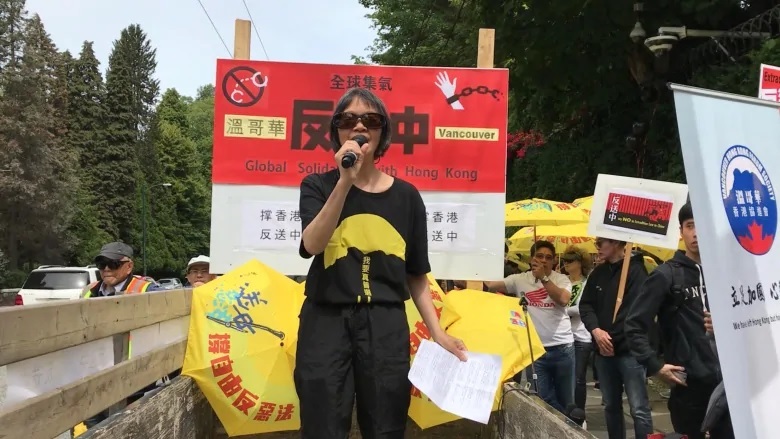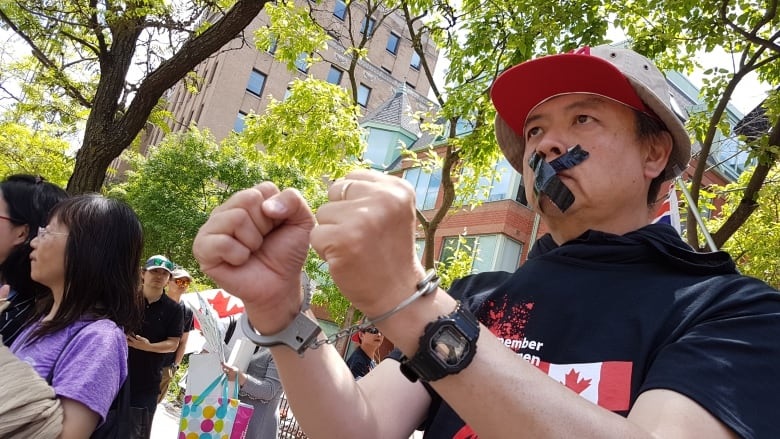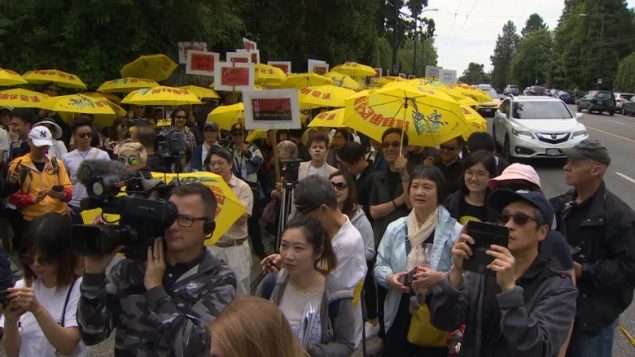Huge crowds continue to demonstrate in Hong Kong over a proposal to enable extradition to China. Hundreds of thousands of Hong Kong residents continue to protest over fears of the implications of the proposed bill. They say it could mean that democracy advocates in the semi-autonomous region, journalists, or business people, or even visitors, or anyone that China feels poses a threat, could be sent to mainland China.
Those growing protests have begun to turn violent with a huge police presence firing tear gas and rubber bullets against the crowds blocking roads. Reports say some two dozen protesters have been injured.

Police and protesters face off in Hong Kong over the proposed extradition law. (Denise Ho-twitter)
In Canada peaceful demonstrations in sympathy with Hong Kong citizens have been taking place.
On Sunday, hundreds gathered outside the Chinese consulate building in Vancouver.
Ivy Li, originally from Hong Kong, but who has lived in Canada for over 30 years says many people fearing Communism, emigrated to Canada from Hong Kong when the Communists took power in China in 1949.

Ivy Li, speaking on behalf of Canadian Friends of Hong Kong (CFHK), on June 9 at the Vancouver rally against Hong Kong’s amendment to its extradition laws. The rally was held outside the Chinese consulate. (Submitted by Ivy Li via CBC)
Their fears of the regime were furthered heightened during the brutal “cultural revolution”, and again with the Tienanmen Square massacre..
She says Hong Kong residents “were terrified by the brutality and they worry that they will lose their way of life, especially freedom of speech … Then, in 1997 when Hong Kong was handed over to Beijing, the fear became more real”.
Also on Sunday in Canada’s biggest city, Toronto, an even larger crowd marched on the Chinese consulate there. The march was organised by the group Canada-Hong Kong Link.

Canada-Hong Kong Link led thousands of people in protest on Sunday against against Hong Kong’s extradition bill. (Michael Charles Cole/CBC)
Gloria Fung, the group’s president, told CBC Toronto “This extradition bill, if enacted, is going to allow China to arbitrarily arrest anybody who is working, travelling, living or even in transit via Hong Kong,” Gloria Fung, the group’s president, told CBC Toronto the the proposed law would “jeopardize the security and interests, not just the citizens of Hong Kong but also the citizens of all countries, and therefore, we Canadians do care about the development. This is particularly the case when we have more than 300,000 Canadians living and working in Hong Kong”.
The bill was to be debated today, but as the crowds blocked roads prevented politicians reaching the city hall. Hong Kong Chief Executive Carrie Lam said the bill would pass.
The Canadian Minister of Foreign Affairs, Chrystia Freeland, released this statement today “Canada has been closely following the proposals of the Hong Kong Special Administrative Region government to amend the Fugitive Offenders Ordinance, which would allow for individuals in Hong Kong to be transferred to all jurisdictions, including mainland China, for prosecution.
The ongoing protests in Hong Kong, which are among the largest in the city’s history, demonstrate the deep concern among the people of Hong Kong about their future.
Canada remains concerned about the potential effect these proposals may have on the large number of Canadian citizens in Hong Kong, on business confidence, and on Hong Kong’s international reputation.
We urge the Hong Kong government to listen to its people and its many friends around the world, and allow time for thorough consultation and consideration before making any amendment to the Fugitive Offenders Ordinance.
Freedom of expression and assembly are the bedrock of Hong Kong’s free society. It is vital that any legislation preserve Hong Kong’s high degree of autonomy, rule of law, and independent judiciary.”
Hong Kong has a 50-year right to its own social, legal, and political systems as part of the deal when Britain handed the region back to China in 1997 when its 99 year lease expired.
Additional information – sources







For reasons beyond our control, and for an undetermined period of time, our comment section is now closed. However, our social networks remain open to your contributions.